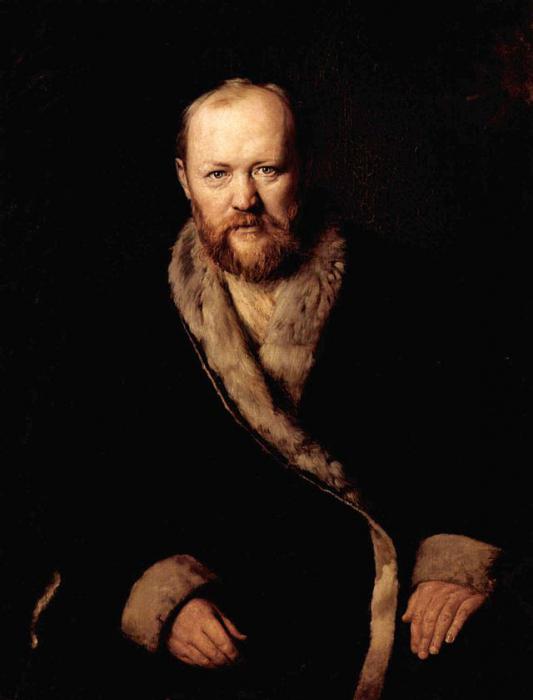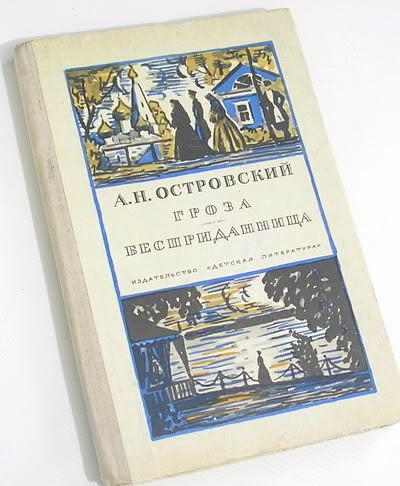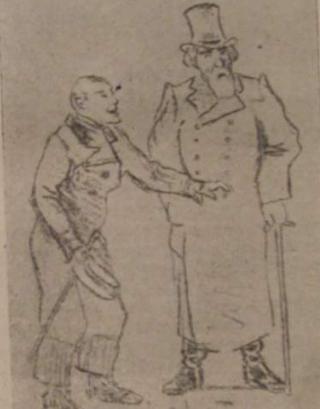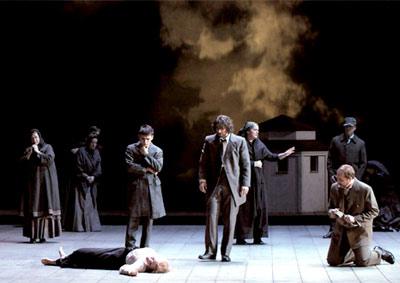The work of A. N. Ostrovsky is at the origins of our national drama. Fonvizin, Griboedov and Gogol began the creation of the great Russian theater. With the advent of the plays of Ostrovsky, with the flowering of his talent and mastery, dramatic art rose to a new height. Not without reason critic Odoevsky noted that before Ostrovsky there were only 3 dramas in Russian literature: “Undergrowth”, “Woe from Wit” and “The Examiner”. He called the play Bankrupt the fourth, emphasizing that it is the last missing cornerstone on which the magnificent “building” of the Russian theater will be erected.
From Bankrupt to Thunderstorm

Yes, it’s precisely with the comedy “We Will Count Our Own People” (the second name is “Bankrupt”) that the widespread popularity of Aleksandr Nikolayevich Ostrovsky, a playwright who combined in his work and masterfully reworked the best traditions of the “natural” school, is social-psychological and satirical. Having become the “Columbus of Zamoskvorechye”, he discovered until now the world an unknown layer of Russian life - medium and petty merchants and philistinism, reflected his originality, showed how bright strong, pure characters, and the grim harsh reality of the world of merchandising, hypocrisy, lack of high impulses and ideals . It happened in 1849. And already in his first significant play, the writer outlines a special type of personality that will appear again and again: from Samson Silych Bolshoi to Tit Titich Bruskov from “In a Feast of a Hangover” and further to Martha Ignatievna Kabanova and Savel Prokopyevich Dikom from “Thunderstorms” - a type of tyrant named very accurately and succinctly and, thanks to the playwright, has entered our everyday life. People who completely violate the logical, moral and
ethical standards of human society live in this category. “The tyrants of Russian life” were called by the critic Dobrolyubov Dika and Kabanikh, representing the “dark kingdom” in Ostrovsky’s play The Storm.
Petty tyranny as a socio-typological phenomenon

Let us analyze this phenomenon in more detail. Why do tyrants appear in society? First of all, from the realization of their own complete and absolute power, the complete leveling of the interests and opinions of others compared to their own, a sense of impunity and lack of resistance from the victims. This is how the “dark kingdom” is shown in Ostrovsky’s play The Storm. Wild and Kabanova - the richest residents of the small provincial town of Kalinov, located on the banks of the Volga. Money allows them to experience personal significance and significance. They also give them power - over their own people, over strangers, people who are somewhat dependent on them, and more broadly - over public opinion in the city. The “Dark Kingdom” in Ostrovsky’s play “The Thunderstorm” is scary because it destroys or warps the slightest manifestations of protest, any trends of freedom and independence. Petty tyranny is the flip side of slavery. It corrupts equally both the "masters of life" and those who are dependent on them, poisoning with their corrupting breath all
spheres of social life in Russia. That is why, according to Dobrolyubov’s definition, the “dark kingdom” in Ostrovsky’s play “Thunderstorm” is a synonym for tyranny.
Drama conflict
Having a deep understanding of reality, the writer was able to portray its most significant and significant aspects. In the pre-reform year of 1859, he was impressed by his travels along the Volga in 1856-1857. creates a play, subsequently recognized as one of his best creations, the drama The Storm. What is interesting: literally a month after the play was completed, events took place in Kostroma that, as in the script, reproduce a literary work. What is this talking about? About how accurately Alexander Nikolaevich felt and guessed the conflict and how “the dark kingdom” is realistically reflected in the play “Thunderstorm”.
It’s not in vain that Ostrovsky chose the main contradiction of Russian life as the main collision - the clash between a conservative principle based on patriarchal traditions formed over the centuries and based on unquestioned authority, moral principles and prohibitions, on the one hand, and on the other, the beginning of a rebellious, creative and living , the need of the individual to break stereotypes, to go forward in spiritual development. Therefore, not only the Wild and the Boar embody the "dark kingdom" in the play "Thunderstorm". Ostrovsky makes it clear that the slightest concession to him, connivance and non-resistance automatically transfer a person to the rank of accomplices.
The philosophy of the "dark kingdom"
From the very first lines of the play, two elements burst into our minds: the
Volga free
space, wonderful distances, wide horizons and the stuffy, condensed atmosphere of a pre-storm, the languid expectation of some shocks and a thirst for renewal. Representatives of the "dark kingdom" in the play "Thunderstorm" are horrified by the cataclysms of nature, seeing in them the manifestation of God's wrath and future punishments for sins - obvious and imaginary. Marfa Ignatievna repeats this all the time, echoes her and Dika. At the request of Kuligin to donate money for the construction of a lightning rod for the townspeople, he reproaches: "The storm is given as punishment, and you, so and so, want to defend yourself from the Lord with a pole." This replica clearly shows the philosophy that the representatives of the “dark kingdom” adhere to in the play “Thunderstorm”: one cannot resist what has dominated for centuries, one cannot go against will or punishment from above, humility and humility must remain the ethical standards of our time. What is interesting: the main tyrants of Kalinov themselves not only sincerely believe in this order of things, but also recognize it as the only correct one.
Prude under the guise of virtue

The Dark Kingdom in A.N. Ostrovsky’s play The Storm has many faces. But the pillars of it are primarily Wild and Kabanova. Marfa Ignatyevna, a mercenary merchant, mistress of the house, behind a high fence of which invisible tears pour and everyday humiliation of human dignity and free will occurs, is explicitly called in the play - a hypocrite. They say of her: "He bestows alms with beggars, goes to church, baptized earnestly, and eats pets at home, grinds like iron rust." She tries to observe the external laws of antiquity in everything, while not particularly caring about their inner content. Kabanikha knows that the younger ones must obey the elders and requires blind obedience in everything. When Katerina parted with Tikhon before his departure, she forces her to bow at the feet of her husband, and her son to give his wife a strict order on how to behave. There you can’t argue with "mother", and "don’t look at guys" and many other "wishes". Moreover, all those present well understand the farcical situation, its falsity. And only Martha Ignatievna revels in her mission. She also played a decisive role in Katerina’s tragedy, distorting the character of her son, ruining his family life, abusing Katerina’s soul and forcing her to take a fatal step from the banks of the Volga into the abyss.
Lie in the rank of law
The Dark Kingdom in A. Ostrovsky’s drama The Storm is tyranny in its highest manifestation. Katerina, comparing life in her own family and in her husband’s family, notices the most important difference: everything here seems to be “out of captivity”. And it is true. Either you obey the inhuman rules of the game, or they will erase you into powder. Kuligin bluntly states that manners in the city are "cruel." He who is rich is trying to enslave the poor in order to increase his fortune on their pennies. The same Wild is clowning over Boris dependent on him: “If you please, I will give the inheritance!” But it is impossible to please the tyrant, and the fate of the unfortunate Boris and his sister is predetermined. They will remain humiliated and offended, powerless and defenseless. Is there a way out? There are: to lie, to dodge, while it is possible. So does the sister of Tikhon - Barbara. Its moral principles are simple: do what you want, as long as no one notices anything, everything is “covered and covered”. And when Katerina protests that she can’t dissemble, can’t lie, Varvara simply says to her: “And I didn’t know how, but it became necessary - I learned it!”

Kudryash, Varvara and others
And what do the victims of the "dark kingdom" in the drama of A. N. Ostrovsky's "Thunderstorm" in general represent? These are people with a broken fate, crippled souls, a mutilated moral world. The same Tikhon is naturally a kind, gentle man. The tyranny of the mother killed in him the rudiments of her own will. He cannot resist her pressure, cannot resist and finds consolation in drunkenness. To support his wife, to stand on her side, to protect him from boar arbitrariness is also beyond his power. At the instigation of his mother, he beats Katerina, although he pities her. And only the death of his wife makes him openly blame his mother, but it is clear that the fuse will pass very quickly, and everything will remain the same.
A completely different matter is another male character - Vanya Kudryash. He doesn’t go into his pocket for a word, repels anyone and even the “piercing” Wild without letting go of rudeness. However, this character is also corrupted by the deadly influence of the "dark kingdom." Kudryash - a copy of the Wild, just not yet entered into force, not matted. Time will pass, and he will be worthy of his master. The barbarian, who has become a liar and suffers from oppression of her mother, eventually runs away from home. Lying became her second nature, and therefore the heroine causes us sympathy and compassion. The timid Kuligin rarely dares to defend himself against the impudence of the tyrants of the "dark kingdom." In fact, no one, except Katerina, also, by the way, the victim, is strong enough to challenge this "kingdom".
Why Katerina?

The only hero of the work who lacks the moral determination to condemn the life and mores of the "dark kingdom" in the play "The Storm" by A. N. Ostrovsky is Katerina. Its naturalness, sincerity, hot impulsiveness, inspiration do not allow reconciling with arbitrariness and violence, and accept etiquette dictated from the time of Domostroy’s times. Katerina wants to love, enjoy life, experience natural feelings, and be open to the world. Like a bird, she dreams of breaking away from the earth, from a dying life and soaring into the skies. She is religious, but not in a boar style. Her straightforward nature is torn in two by the contradiction between duty to her husband, love for Boris and the realization of her sinfulness before God. And all this is deeply sincere, from the very depths of the heart. Yes, Katerina is also a victim of the "dark kingdom." However, she managed to break his fetters. Shook the centuries-old foundations. And she was able to point the way out to others - not only by her death, but by protest in general.